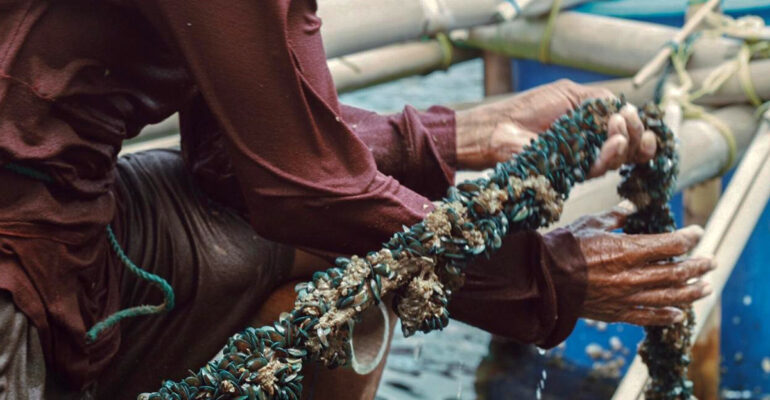Harvest Threatened, IPB University Students Use Stepping Technique To Increase Shellfish Production

Banten Province is known as a province which is one of the centers of green mussels production in Indonesia. This is because natural and environmental conditions in Banten are suitable for producing good quality green mussels. Based on data from the Central Statistics Agency of Serang City (2016), the contribution of Kasemen District to 2014 aquaculture production in the City of Serang was 681.93 tons from marine aquaculture.
Three students from the Department of Resource Economics and Environment and the Aquaculture Department of IPB University captured the tantalizing potential of these marine products. Incorporated in the Student Creativity Program in the field of Humanities Research (PKM-PSH), this IPB University student conducted research to analyze the cost benefit and social ecological system of sustainable green mussel cultivation in Serang City, especially in Kasemen District. The team consisting of Arwa Inas Shafiya, Bangkit Laksono and Afirsta Yutrisya was under the guidance of Kastana Sapanli, SPi, M.Sc.
The background of this study is that the production of armor is strongly influenced by the production methods applied by fishermen.
Inas said that the production of shellfishes in the past two years has tended to decline due to bad weather. The process of cultivating green mussels in the Banten area is done by step and raft methods. The difference in cultivation methods also affects the productivity of green mussels, this is because each method has a different technical age and endurance to weather changes.
"Our results show that the cultivation of green mussels with stepping methods is more feasible to run financially. The stepping method is a method that uses a frame made with parts of the box on land, then plugs in the sea and attaches a collector's rope to collect shellfish seeds," said Inas.
Inas added, based on data from the Serang City Agriculture Service, currently the shellfish cultivated in the Banten area are only green mussels. The produce produced is sold to the city or middlemen in Serang City and its surroundings such as Jakarta and Tangerang. Mussels are usually sold in raw condition with the condition still fused with the shell that had been boiled beforehand. In addition, some residents also tried processing shellfish into crackers and meatball products, but this effort had not yet reached the marketing stage due to the limited raw materials and production capital.
The average cultivation of green mussels carried out by the coastal communities of Banten is a side income, this is because fishermen are only focused on fishing daily. This shellfish cultivation business can support the income of fishermen whose income is still lacking if they only rely on fishing catches.
"The recommendation that we convey regarding green mussel cultivation in Serang City is that fishermen are better focused on using stepping methods. There is a need for a study of the determination of the exact location of green mussel cultivation, given the potential for upwelling in the sea of aquaculture, monitoring the implementation of the government's Good Aquaculture Practice (GAP) standard for local farmers. This monitoring is carried out mainly from the technology side, so that the production of green mussels can continue to be improved and the provision of assistance is accompanied by guidance to farmers regarding the production and processing of green mussel production waste," closed Inas (RYS)



